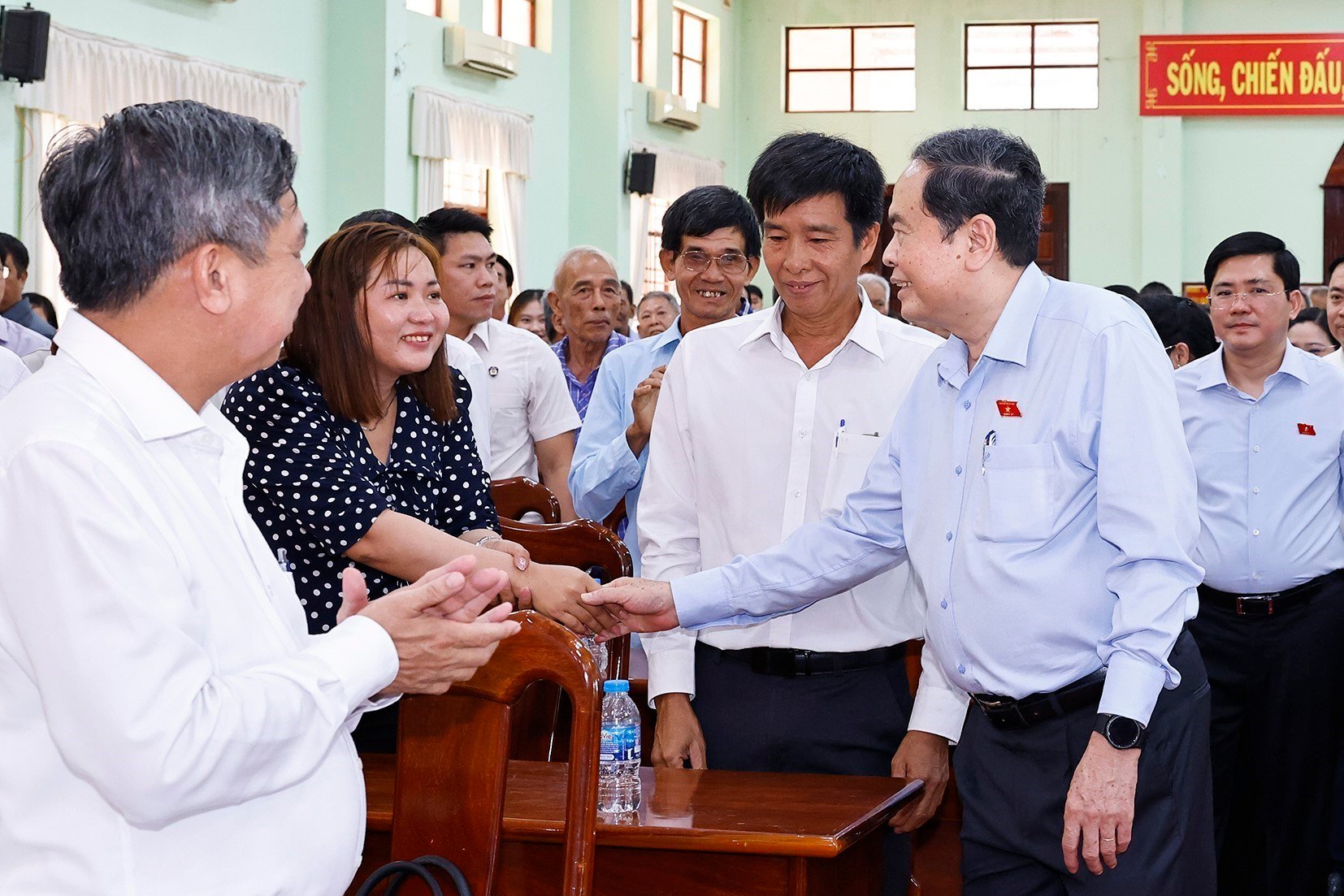
Building a socialist rule-of-law state in Vietnam - a premise and fundamental value in the era of national development
The rule of law state is a modern state organization model, in which state power is established and operated on the basis of respect for the Constitution and law, aiming at the goal of democracy, ensuring human rights and citizen rights. In Vietnam, the construction and completion of the socialist rule of law state is of special importance, not only as a requirement to realize the goals identified in the 2013 Constitution and Resolution No. 27-NQ/TW, dated November 9, 2022, of the 6th Central Conference, 13th tenure, "On continuing to build and perfect the socialist rule of law state of Vietnam in the new period", but also to ensure that people can enjoy the substantive values of democracy, fairness and humanity, expressed through legal regulations, state apparatus organization, activities to protect justice, human rights and citizen rights.
Born from the foundation of democracy and the objective needs of socialist society, the Socialist Rule of Law State of Vietnam exists and develops in parallel with the process of expanding socialist democracy and building a socialist-oriented market economy within the framework of the political system led by the Communist Party of Vietnam . With the nature of a state of the people, by the people and for the people, with all state power belonging to the people, the Socialist Rule of Law State of Vietnam is built on the following core values: (1) Ensuring people's sovereignty; (2) Upholding the Constitution and the law; (3) Recognizing, respecting, ensuring and protecting human rights and civil rights; (4) Ensuring that state power is unified, with clear division of labor, close coordination and effective control; (5) Implement the principle of ensuring the highest national interests, on the basis of complying with the fundamental principles of the United Nations Charter, international law and international commitments to which Vietnam is a member. The 13th National Party Congress has set out important orientations, viewpoints and solutions to continue promoting the construction and perfection of this state model. This is identified as a key task in the process of renewing the political system, implemented synchronously, closely linked with comprehensive renewal to ensure and promote socialist democracy, while creating, renewing and developing economic, cultural and social fields for people and for social progress. Implementing the policy of the 13th National Congress, on November 9, 2022, the 13th Party Central Committee issued Resolution No. 27-NQ/TW, clearly defining the general goals, 5 guiding viewpoints and 10 groups of tasks and key solutions to continue perfecting the socialist rule-of-law State of Vietnam in the new context.
Thanks to the continuous efforts in building a socialist rule-of-law state, in recent years, Vietnam has achieved a number of outstanding achievements:
Firstly, a legal mechanism has been basically established to ensure consistent implementation of the principle that “all state power belongs to the people ”. Democracy has been increasingly consolidated and expanded; the constitutional rights of the people, especially the right to direct democracy, have been gradually concretized by law and put into practice. The responsibility of the State to the people has been increasingly enhanced.
Second, state power has been assigned, regulated and limited in a more reasonable and strict manner through the Constitution and the legal system . The functions, tasks, powers and roles of agencies in the state apparatus are defined more clearly than before. This has narrowed the space for possible errors in the operations of agencies and public officials. The people - as the supreme subject of state power - are also increasingly aware of their mastery and the responsibilities and scope of activities of each state agency.
Third, the supreme position of the Constitution is affirmed . Vietnam's Constitutions in each period have consistently expressed the spirit that the Constitution is the fundamental law, with the highest legal effect; "The State is organized and operates according to the Constitution and the law" (1) ; "All other legal documents must be consistent with the Constitution. Any violation of the Constitution will be handled" (2) ; " The National Assembly , the President, the Government, the People's Court, the People's Procuracy, other State agencies and the entire people have the responsibility to protect the Constitution" (3) .
Fourth, the state apparatus is being innovated and improved in the direction of becoming increasingly streamlined, effective and efficient . The capacity of legislative, executive and judicial agencies is increasingly enhanced. The responsibility of the state apparatus, of each cadre and civil servant in the state apparatus, especially the team of leaders and managers, is clearly defined. Control of power in the performance of public duties is strengthened in the direction that the more authority and higher position cadres and civil servants have, the more strictly they must be controlled.
Fifth, the legal system has been built and perfected in the direction of increasingly approaching the requirements of the rule of law , specifically: (1) The process of building and promulgating laws increasingly ensures democracy, publicity, transparency and is more closely linked to the reality of social life. (2) The content of legal documents increasingly reflects the will and aspirations of the people; at the same time clearly demonstrates the values of fairness, democracy and equality. Laws not only aim to protect and ensure freedom, democracy, human rights and civil rights, but also promote the role of creating development for the socialist-oriented market economy, while ensuring legal security for people and businesses. (3) The transparency, feasibility, unity, synchronization, stability, predictability and accessibility of the legal system are increasingly improved. (4) From being a tool for social management of the state, the law is gradually becoming an institution for people to exercise their power, and at the same time a basis for controlling and limiting state power.
Sixth, the recognition, respect, protection and guarantee of human rights and civil rights have achieved many achievements. The law on human rights and civil rights has been focused on perfecting in all fields: political, civil, economic, cultural and social. The 2013 Constitution clearly affirms that the guarantee and protection of human rights and civil rights is the top priority of institutions in the state apparatus. On the basis of constitutional principles, many laws and codes have been promulgated to concretize the provisions of the Constitution, creating a legal basis for the guarantee and protection of human rights, especially the rights of disadvantaged and vulnerable groups. In addition, the State has actively and proactively participated in global and regional mechanisms on human rights, including ratifying and joining 7/9 basic international conventions on human rights. In the judicial field, the protection of human rights has been increasingly focused; Investigation, prosecution, trial, execution of sentences, as well as measures of arrest, detention, custody, and reform are all carried out strictly, democratically, and fairly, contributing to reducing injustice and mistakes in litigation.
Seventh, the principle of the Communist Party of Vietnam leading the State and society continues to be consistently affirmed throughout the process of formation and development of the State of Vietnam , from the Democratic Republic of Vietnam to the current Socialist Republic of Vietnam. This principle has been recognized by the people and institutionalized in the Constitutions of 1980, 1992 and 2013.
Thus, the construction and completion of the Socialist Republic of Vietnam's rule of law state has made an important contribution to the great achievements in the cause of national development. This state model has increasingly performed better its role of devotedly serving the people, serving the Fatherland, protecting justice, human rights and civil rights. Under the leadership of the Communist Party of Vietnam, the Socialist Republic of Vietnam's rule of law state has constantly improved to be worthy of being the foundation of core values, demonstrating and honoring the good achievements that our people have worked hard to build with sweat and blood throughout historical periods. This is also the foundation to create new position and strength for our country to confidently integrate and develop in the new era, as General Secretary To Lam affirmed: " Building a socialist rule-of-law state in Vietnam is a measure and method to successfully implement the goals of our Party as defined in the Party Charter: to build an independent, democratic, prosperous Vietnam, a fair and civilized society, without exploitation of man by man, successfully implementing socialism and ultimately communism " (4) .
New era, new requirements and challenges for building and perfecting the socialist rule of law state of Vietnam
The new era is the period when Vietnam aims to transform itself from a developing country into a modern, rich and powerful country with an increasingly high position in the international arena. This is a period of important changes in the economy and society. Every country in the world in general and Vietnam in particular must deal with global challenges, such as climate change, cyber security, epidemics, participation in United Nations peacekeeping, etc. This is also the process in which Vietnam enters a period of building a strategy for developing a digital economy, digital society and applying science and technology in all areas of life, laying the foundation for comprehensive development. Cultural values and national cultural identity need to be preserved, protected and promoted. The application of progressive values must be balanced with the preservation of traditional values so that culture can also become a resource for sustainable development. This is completely consistent with the goal of developing the country and building and perfecting the Vietnamese socialist rule-of-law state set out in Resolution No. 27-NQ/TW of the Communist Party of Vietnam. To contribute to achieving great achievements in the new era, in the coming years, Vietnam needs to accelerate, be more determined and focused in organizing and implementing the task of building and perfecting the Vietnamese socialist rule-of-law state, specifically:
Firstly, it is necessary to focus on building a legal system that is democratic, fair, humane, complete, synchronous, unified, timely, feasible, public, transparent, stable, accessible, strictly and consistently implemented. To achieve this goal, it is necessary to first of all renew the way of thinking about law, considering the law not only as a management tool of the state, but also as a tool in the hands of the people for the people to exercise their right to mastery, for the people to monitor and control state power, promote creativity, unleash all resources for development; as a symbol of justice, righteousness, democracy and human rights, and as the foundation of peace, order and development. The law has the noble mission of expressing and ensuring the practical implementation of the core values of the Socialist Republic of Vietnam, orienting and regulating socio-economic activities towards the goal of building a society without oppression and injustice, focusing on protecting the interests and supporting disadvantaged groups, narrowing the gap between rich and poor, where everyone is equal, free and has conditions for development and improvement.
Second, ensuring in practice the principle that the State is organized and operates on the basis of the Constitution and the law. State agencies and civil servants are only allowed to do what the law prescribes, not to arbitrarily, abuse power, or abuse power, ensuring that power is not corrupted, public power must be for the public interest, and cannot be dominated by personal will or interest groups . Promoting the construction and perfection of the Vietnamese socialist rule of law state is also the process by which the State promotes its role in creating development, consolidating the great national unity bloc, ensuring social consensus, and enhancing people's trust in the fairness, transparency, and effectiveness of the legal system and the State.
Third, the Vietnamese socialist rule-of-law state must realize what President Ho Chi Minh wished for: "All must have the spirit of the rule of law" (5) . That state is characterized by the combination of the principle of respect for the Constitution and the law with the good values of socialist society. This is both a very important requirement for the state and an orientation for the activities of the political system with the highest goal of serving the people and the Fatherland. The people are the supreme subject of state power, all state power belongs to the people, the state serves the interests of the people, all policies and laws of the state must aim at improving the material and spiritual life of the people; create an open democratic space for people to participate in state management, supervise, criticize and contribute opinions on the activities of the state apparatus, ensuring that "Our country is a democratic country, the highest position belongs to the people, because the people are the masters. In the revolutionary apparatus, from the person who sweeps the house, cooks to the President of a country, all are assigned to be servants of the people" (6) ; "All policies and guidelines of the Party, policies and laws of the state are for the benefit of the people" (7) .
In the current context, especially when the world has complex changes in both politics and economy, the construction and completion of the Socialist Republic of Vietnam's rule of law state is facing a number of challenges as follows: The internal challenge is that the organization of the state apparatus and the legal system still has some shortcomings, failing to meet practical requirements. State power has not been effectively controlled (8) ; the supervisory role of the Vietnam Fatherland Front, socio-political organizations and the people has not been strongly promoted; the awareness of law observance of a number of cadres, civil servants, party members and the people is not strict (9) ; the mechanism to ensure the people's right to mastery, human rights and civil rights has not been fully promoted; administrative reform and judicial reform have not met development requirements...; The legal system is not yet complete and synchronous, many legal documents are still inconsistent, causing difficulties in application, some legal regulations are not suitable for practice, not keeping up with the rapid development of the digital ecosystem and international integration today (10) . The organization and operation of the state apparatus is still bureaucratic and ineffective, some state agencies are still cumbersome, with overlapping functions and tasks, leading to waste of resources. Corruption and group interests in the state apparatus are still difficult problems, causing people to lose confidence in the effectiveness of law enforcement. The quality of cadres and civil servants is not uniform, a number of cadres do not meet the requirements of qualifications, capacity, and public ethics, reducing the effectiveness of the apparatus. The role of people in giving opinions, supervising state activities and democracy at the grassroots level has not really been effectively promoted (11) . Legal education and propaganda work is still weak and has not been widely spread in society. State management work has not met the requirements, especially in the current digital context.
The external challenge is the competition for power and strategic adjustment of major countries, which creates many difficulties and challenges for the task of maintaining independence and sovereignty. Our Party has made correct assessments and viewpoints: "Strategic competition between major countries is very complicated and fierce; the multipolar situation is increasingly clear" (12) ; "The Asia-Pacific region, in which Southeast Asia has an increasingly important strategic position, is an area of fierce competition between major powers, with many potential instabilities" (13) . The impact of the globalization and international integration process, the conformity between national law and international law to both ensure national interests such as economic interests, preserve national cultural identity, and actively participate in the globalization process is a significant challenge (14) . Climate change, natural disasters and environmental impacts such as rising sea levels, storms, floods, droughts, requirements of sustainable development such as reducing greenhouse gas emissions, environmental protection... create great challenges in balancing economic growth and environmental protection (15) . Transnational crime and cyber security issues such as illegal drug trafficking, human trafficking, online fraud, user data leaks, cyber espionage... are becoming serious problems, requiring the legal system and law enforcement mechanisms to be strong enough to cope; the rapid development of technology and the internet increases risks such as cyber attacks, information theft and data manipulation (16) ...
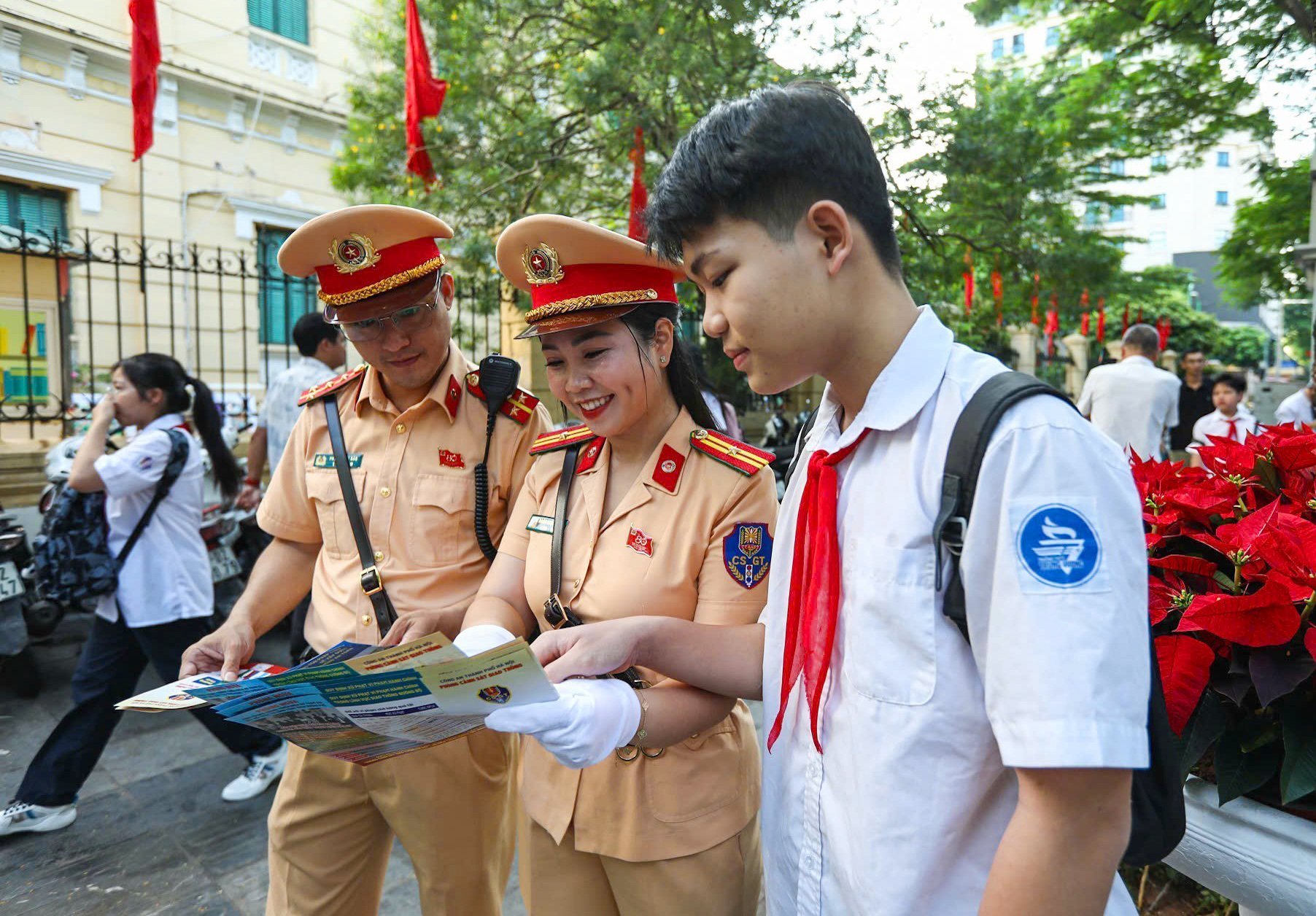
Orientation to build and perfect the socialist rule of law state of Vietnam for the nation to rise up in the new era
To build and perfect the socialist rule-of-law state of Vietnam, in the coming time it is necessary to focus on the following issues:
Firstly, it is necessary to effectively implement Resolution No. 27-NQ/TW, because this is an important Resolution of our Party on the Socialist Rule of Law State of Vietnam, with broad and profound content, related to all institutions in the political system. After more than two years of implementation, Vietnam has achieved many important results, in fact, the people have somewhat felt the benefits that the Socialist Rule of Law State of Vietnam brings. However, in the new situation, when the whole country and the whole nation under the leadership of the Party are determined to rise up in the new era, there is a requirement to better implement the 10 tasks set out in Resolution No. 27-NQ/TW, especially for the key tasks, creating more solidity in the premise and conditions for the nation to confidently rise up in the new era. Speed up progress, focus on breakthrough tasks to create clear changes in building the socialist rule-of-law state of Vietnam, contributing to creating a solid foundation for the country's development in the new era.
Second, it is necessary to conduct in-depth and comprehensive research to effectively, harmoniously and synchronously handle the great relationship: "The Party leads, the State manages, the people are the masters" . In particular, it is necessary to focus on building a comprehensive, unified and feasible system of institutions and mechanisms to ensure the smooth, harmonious and effective operation of institutions in the political and social system, creating a combined strength to promote national development in the new era. The relationship between the Party - State - people was identified by the late General Secretary Nguyen Phu Trong as a fundamental pillar and is likened to the "three solid legs" of the cause of building and defending the Fatherland. Accordingly, the Party's leadership is the core feature of the Socialist Republic of Vietnam's rule-of-law State, ensuring the orientation and nature of the State as of the people, by the people, for the people. The State represents the people's mastery and is the entity that organizes the implementation of the Party's guidelines, with the goal of serving the people and developing the country. At the same time, the State has the responsibility to recognize, respect, protect and ensure the people's mastery through specific, practical and effective mechanisms; constantly improve the people's mastery capacity; and ensure the conditions for the people to exercise their mastery in reality.
People's mastery is not only the core goal of the regime, but also the fundamental value that establishes the legitimacy of the Party's leadership role and the State's management role. Through the Constitution, the people have chosen the socialist regime, affirmed the Party's leadership role, delegated power and established a mechanism to control State power, and at the same time determined the State's responsibility in respecting, protecting and ensuring human rights and civil rights. Thus, the relationship between Party leadership and State management is unified in nature and goals, both aiming to ensure and promote people's mastery. That mastery is both the basis for affirming the legitimacy of the Party and State, and an important endogenous driving force for national development and realizing the nation's aspirations. Therefore, people's mastery has become an important criterion to evaluate the effectiveness of the Party's leadership, the effectiveness of State management and the level of perfection of the Socialist Republic of Vietnam.
Practice shows that the Communist Party of Vietnam has achieved many positive results in establishing and perfecting the mechanism to ensure this relationship. However, in the new context, with the requirements of Resolution No. 27-NQ/TW on continuing to institutionalize and perfect the mechanism, especially emphasizing the motto "people know, people discuss, people inspect, people supervise, people benefit", it is necessary to continue researching and establishing a comprehensive and synchronous mechanism between institutions in the political system. The goal is to both promote the individual role of each institution and create a combined strength for the people's mastery and the sustainable development of the Socialist Republic of Vietnam.
Third, it is necessary to continue to innovate and effectively promote the three fundamental pillars of national development, which are a modern rule-of-law state, a fully developed market economy and a highly developed democratic society. In particular, the rule of law and the rule of law must always be established as a consistent principle, governing all social interactions as well as the relationship between these three pillars. The key driving force for national development is the comprehensive innovation of the state apparatus, while harmoniously handling the relationship between the State, the market and society. The judicial apparatus needs to be strengthened in the direction of independence in adjudication, protection of justice, human rights, civil rights and legitimate interests of the State, organizations and individuals; at the same time, having the capacity to resolve increasingly complex disputes and violations of the law in modern society. In addition, in the relationship with the socialist-oriented market economy, It is necessary to build a developmental state, promote a dynamic, competitive economy, capable of effectively participating in the global value chain. Economic institutions need to encourage innovation, unleash all resources, and meet the requirements of the digital age. To achieve that, it is necessary to establish an effective mechanism for handling conflicts of interest, considering this a central and challenging task. The regulatory role of the State in the economy needs to be adjusted in the direction of reducing direct intervention, shifting strongly to creating a fair, transparent and inclusive competitive environment, especially in ensuring ownership, property rights and land use rights.
The era of rising up marks the strong development of the Vietnamese nation, which has been affirmed by outstanding achievements in economy and society. In that context, continuing to build and perfect the Socialist Republic of Vietnam is not only a key task but also an inevitable requirement, aiming to create a solid political and legal foundation for sustainable development, modernization of the country, while enhancing the role, position and prestige of Vietnam in the region and in the international arena./.
------------------------------
(1) Article 8, Constitution of the Socialist Republic of Vietnam 2013
(2) Article 119, Constitution of the Socialist Republic of Vietnam 2013
(3) Article 119, Constitution of the Socialist Republic of Vietnam 2013
(4) To Lam: Promoting Party spirit in building a socialist rule-of-law state in Vietnam, Electronic Communist Magazine , October 20, 2024, https://tapchicongsan.org.vn/media-story/-/asset_publisher/V8hhp4dK31Gf/content/phat-huy-tinh-dang-trong-xay-dung-nha-nuoc-phap-quyen-xa-hoi-chu-nghia-viet-nam
(5) Ho Chi Minh: Complete Works , National Political Publishing House Truth, Hanoi, 2011, vol. 1, p. 473
(6) Ho Chi Minh: Complete Works, op. cit ., vol. 7, p. 434
(7) Documents of the 12th National Congress of Delegates , Central Office of the Party, Hanoi, 2016, p. 160
(8) Tran Ngoc Duong: Controlling power in the Socialist Republic of Vietnam's rule-of-law State in the spirit of Resolution 6 of the 13th Central Committee, Electronic Communist Magazine , October 15, 2023, https://tapchicongsan.org.vn/media-story/-/asset_publisher/V8hhp4dK31Gf/content/kiem-soat-quyen-luc-trong-nha-nuoc-phap-quyen-xa-hoi-chu-nghia-viet-nam-theo-tinh-than-nghi-quyet-hoi-nghi-trung-uong-6-khoa-xiii#:~:text =Ki%E1%BB%83m%20so%C3%A1t%20quy%E1%BB%81n%20l%E1%BB%B1c%20l%C3%A0%20m%E1%BB%99t%20nguy%C3%AAn%20t%E1%BA%AFc,c %C6%A1%20ch%E1%BA%BF%20ki%E1%BB%83m%20so%C3%A1t%20quy%E1%BB%81n%20l%E1%BB%B1c%20nh%C3%A0%20n%C6%B0%E1%BB%9Bc.
(9) Nguyen Duc Minh: Raising legal awareness of cadres, civil servants and public employees to meet the requirements of building a socialist rule-of-law state in Vietnam, Electronic Communist Magazine , December 29, 2021, https://tapchicongsan.org.vn/quan-triet-va-thuc-hien-nghi-quyet-dai-hoi-xiii-cua-dang/-/2018/824718/nang-cao-y-thuc-phap-luat-cua-can-bo%2C-cong-chuc%2C-vien-chuc%2C-dap-ung-yeu-cau-xay-dung-nha-naoc-phap-quyen-xa-hoi-chu-nghia-viet-nam.aspx
(10) Luc Viet Dung: Perfecting the legal system in the new period, Democracy & Law Magazine, October 6, 2023, https://danchuphapluat.vn/hoan-thien-he-thong-phap-luat-trong-giai-doan-moi
(11) Mai Hai Oanh: Promoting socialist democracy in Vietnam today, Electronic Communist Magazine, August 21, 2020, https://tapchicongsan.org.vn/nghien-cu/-/2018/817155/phat-huy-dan-chu-xa-hoi-chu-nghia-o-viet-nam-hien-nay.aspx
(12) Documents of the 13th National Congress of Delegates , National Political Publishing House Truth, Hanoi, 2021, vol. I, p. 207
(13) Documents of the 13th National Congress of Delegates, op. cit. , vol. I, p. 107
(14) Nguyen Manh Hung: On Vietnam's international integration and participation in the globalization process, Electronic Communist Magazine, February 18, 2021, https://tapchicongsan.org.vn/quoc-phong-an-ninh-oi-ngoai1/-/2018/821539/ve-hoi-nhap-quoc-te-va-tham-gia-tien-trinh-toan-cau-hoa-cua-viet-nam.aspx
(15) Pham Tat Thang : Climate change and economic growth, Electronic Communist Magazine , January 3, 2017, https://tapchicongsan.org.vn/nghien-cu/-/2018/42846/bien-doi-khi-hau-va-tang-truong-kinh-te.aspx
(16) Pham Khanh Hoa: Challenges to ensuring human rights in cyberspace, Party Building Magazine, October 2, 2024, https://xaydungdang.org.vn/nhan-quyen-va-cuoc-song/thach-thuc-bao-dam-quyen-con-nguoi-tren-khong-gian-mang-21723
Source: https://tapchicongsan.org.vn/web/guest/chinh-tri-xay-dung-dang/-/2018/1166402/xay-dung-nha-nuoc-phap-quyen-xa-hoi-chu-nghia-viet-nam%2C-kien-tao-gia-tri-nen-tang-de-dan-toc-vuon-minh-trong-ky-nguyen-moi.aspx




![[Photo] Deep sea sand deposits, ancient wooden ship An Bang faces the risk of being buried again](https://vphoto.vietnam.vn/thumb/1200x675/vietnam/resource/IMAGE/2025/11/13/1763033175715_ndo_br_thuyen-1-jpg.webp)



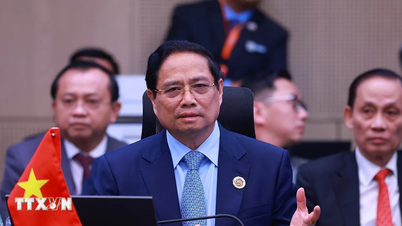

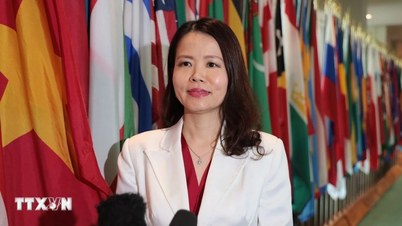




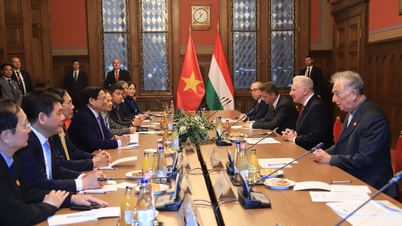

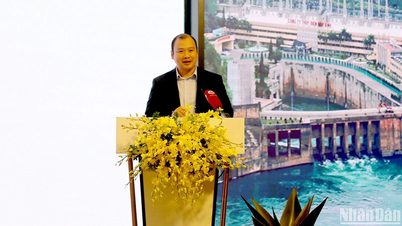
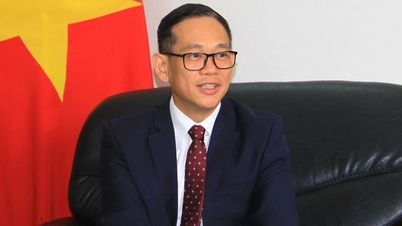

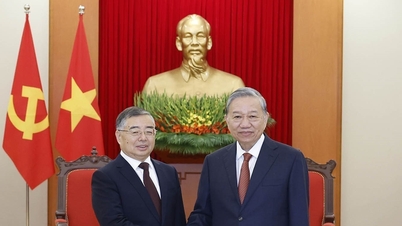


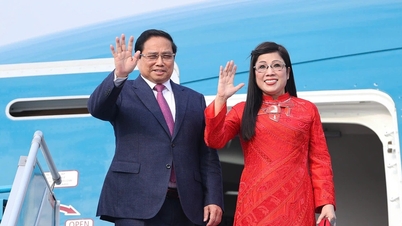
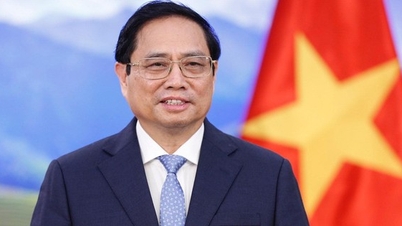
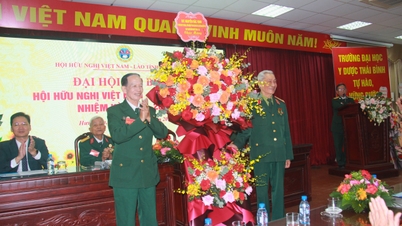










































![[Photo] Panorama of the 2nd Vietnam-Cambodia Border Defense Friendship Exchange](https://vphoto.vietnam.vn/thumb/402x226/vietnam/resource/IMAGE/2025/11/13/1763033233033_image.jpeg)
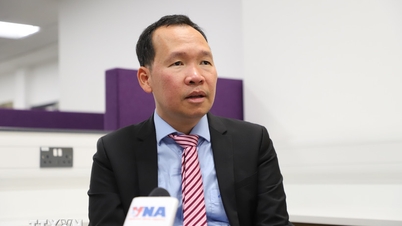

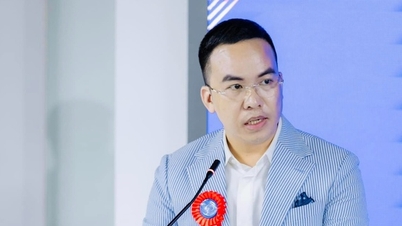
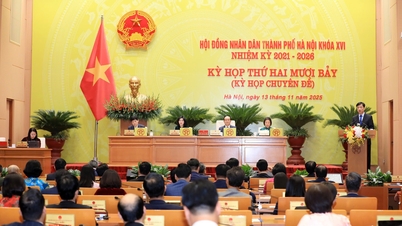

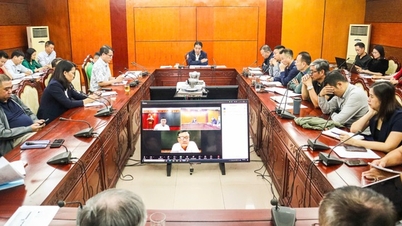

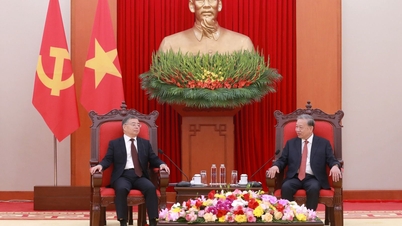
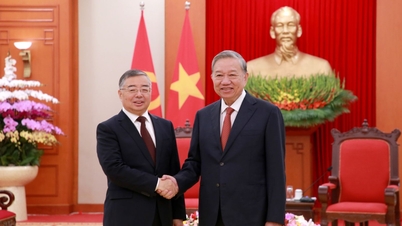


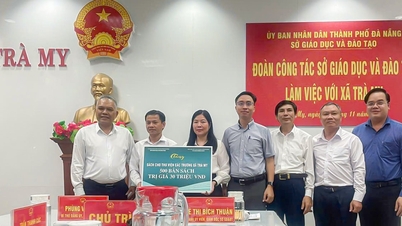





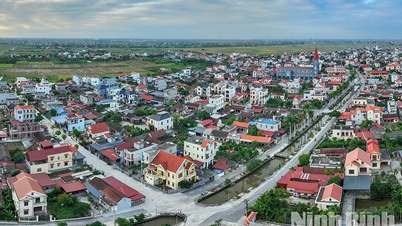







![Dong Nai OCOP transition: [Article 3] Linking tourism with OCOP product consumption](https://vphoto.vietnam.vn/thumb/402x226/vietnam/resource/IMAGE/2025/11/10/1762739199309_1324-2740-7_n-162543_981.jpeg)







Comment (0)